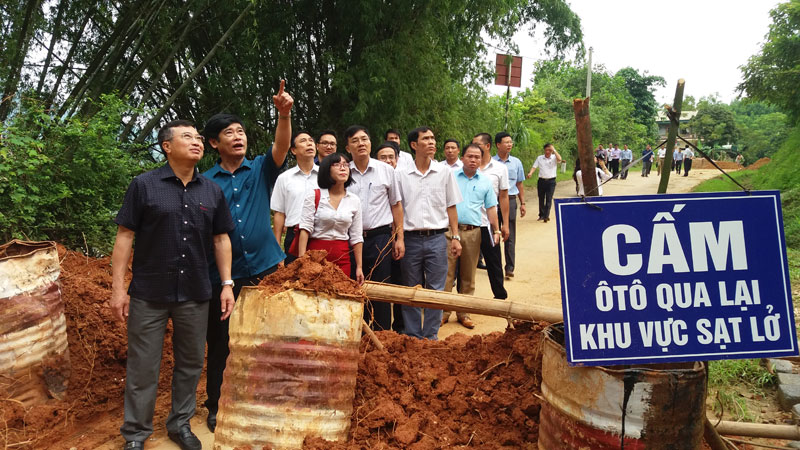
(HBO) – The Central Steering Committee for Natural Diaster Prevention and Control led by Deputy Minister of Industry and Trade Hoang Quoc Vuong has inspected flood relief works in Hoa Binh province.
Vice Chairman of the provincial People’s Committee Nguyen Van
Dung, and representatives from departments, agencies, the People’s Committees
and Ky Son People’s Committee of Hoa Binh city and Ky Son district were present
at a working session with the delegation on August 14.
Reporting local damage triggered by natural disasters, and the province’s
post-disaster recovery, the provincial People’s Committee said that natural
calamities have caused heavy losses in local production and infrastructure.
Total damage is estimated at over 1.29 trillion VND. Meanwhile, 741 households
have been affected, and thousands of hectares of crops have been devastated. Local
roads have been blocked by tens of cubic metres of rock and soil.

Deputy Minister of Industry and Trade
Hoang Quoc Vuong and the working group inspect landslide and crack sites on road
No.445 in May Giay hamlet, Dan Ha commune, Ky Son district.
The provincial People’s Committee proposed the working group support
the locality to carry out urgent works to overcome consequences of natural
disasters, including the tackling erosion and landslide sites in the lower
basin of Da river and on road No.445, and upgrading the dyke system on the left
bank of Da river and residential group 26 of Hoa Binh city’s Dong Tien ward.
It is necessary to ensure stability for disaster-hit households as well, the
people’s committee said.
On behalf of the working group, Vuong took note recovery efforts of Hoa Binh
and asked local authorities to actively implement measures in response to
natural disasters. Attention should be paid to updating weather developments as
well as inspecting and strengthening dykes, irrigational, transport and public
works.
Meanwhile, relevant parties should strictly follow the operation process to
ensure safety for reservoirs during the rainy season, he noticed.
Vuong said that the efforts will help the locality to mitigate damage caused by
natural disasters, and stabilise local lives soon./.
The Department of Education and Training of Hoa Binh province held a conference on March 18 to review the performance of the "Safe and Happy School" Project and set out tasks for 2025. The project, funded by the Taiwan Fund for Children and Families (TFCF), aims to create a safe, inclusive, and supportive learning environment for students. The event saw the attendance of representatives from the TFCF and 26 beneficiary schools.
With over 70% of their workers being women, trade unions across industrial parks (IPs) in Hoa Binh have been actively safeguarding their legal rights and interests while implementing initiatives to improve their income and well-being.
In recent years, the Hoa Binh provincial General Hospital has continuously innovated itself and improved the quality of medical services to meet the increasing needs of local people. With substantial investments in infrastructure and modern equipment, along with a team of highly qualified doctors and nurses, the hospital has gradually established itself as one of the leading medical units in the Northwestern region and a trusted destination for healthcare for people inside and outside the province.
From mastering the fundamentals of programming to achieving national recognition, the Programming Club of the Le Van Tam Primary School (STAR LVT28) in Hoa Binh city has made remarkable strides in the field of robotics.
The Ho Chi Minh Communist Youth Union Committee and the Vietnam Youth Federation chapter of Hoa Binh province organised a programme on March 12 to launch the "Digital Literacy" movement and an online quiz on the resolutions of the Vietnam Youth Federation congresses at all levels, as well as the Politburo's Resolution No. 57-NQ/TW on breakthroughs in the development of science, technology, innovation, and national digital transformation.
As climate change grows more unpredictable, the development of production forests has become essential - not just for economic growth, but for safeguarding the environment and maintaining ecosystem balance. By boosting local incomes, curbing natural disasters, preventing soil erosion, and protecting water resources, these forests play a crucial role in sustainable development.



